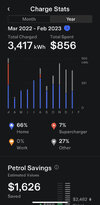Value Collector
Have courage, and be kind.
- Joined
- 13 January 2014
- Posts
- 12,236
- Reactions
- 8,479
Does anyone else think that maybe a degree of government coordination is required to standardise charging outlets or is this just one of those things the government should stay out of and let develope on its own ?
40,000km + on mine so far, $0 spent on service so far.if you need, want or can drive 10 hours straight on the highway good luck to you & everyone around you.
My wife and I stopped travelling to get from one place to another as fast as possible when we were much younger. Now we travel to to take in the sights & experience the local areas we drive through, always stopping after about 4 hours for a stroll through a town and maybe a coffee or snack and a chat. My other car is capable of 900+ kilometers on a tank, we still stop every 4 or 5 hours. We don’t rush anymore.
Another benefit of the Tesla is no service costs. 28,000km so far an $0 in servicing.
View attachment 152348







